Biography: Akbarnama
- January 25, 2021
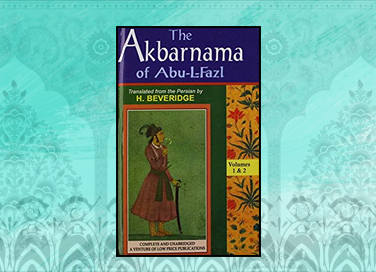
Biography: Akbarnama
- January 25, 2021
By Srinidhi Murthy
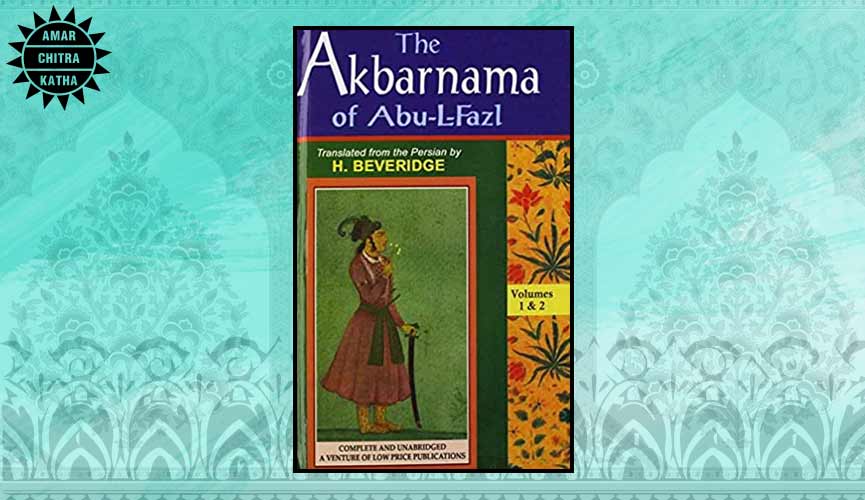
It is a widely known fact that the Mughal Emperor Akbar was illiterate, but scholars flourished during his reign. It is fascinating to note that at the time of his death, in 1605, the imperial library of Akbar contained twenty thousand volumes. This was mainly because of Akbar’s interest in gaining knowledge and his enthusiasm in surrounding himself with wise men who provided him with the knowledge that he failed to gain through formal education.
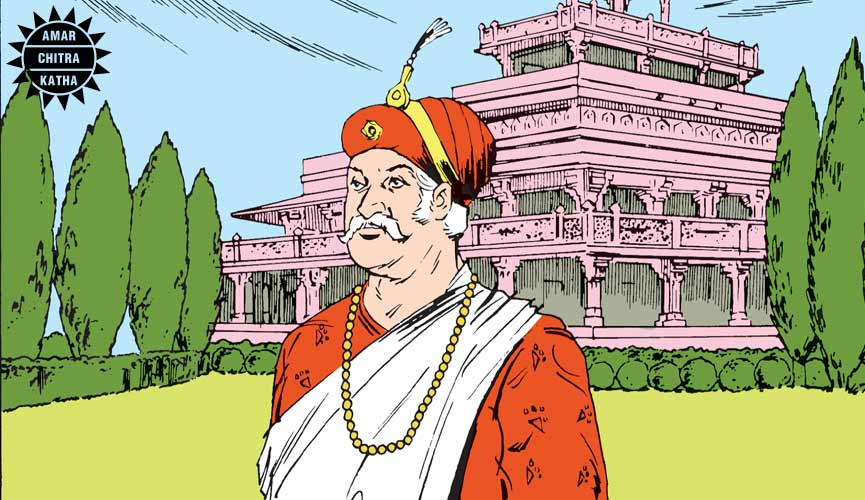
Akbar’s capabilities as a ruler were exemplified by people he surrounded himself with. Among these were notable administrators like Man Singh, Khwaja Mansur, Amir Fathullah Shirazi, Todar Mal, and students like Nizam-ud-din Bakhshi. He also had the first Grand Mufti of India, an Islamic scholar, a historian and translator, Abdul Qadir Badayuni in his court. Akbar’s ingenious minister, Raja Todar Mal, introduced the Patwari system which is employed even in modern India.
To receive more such stories in your Inbox & WhatsApp, Please share your Email and Mobile number.
Akbarnama, written by a learned courtier of Akbar, Abul Fazl, describes the increase of literature during the reign of Akbar. Abul Fazl served as the court chronicler at the Mughal court and also a personal confidant of Akbar. Subjects of intellect and philosophy were encouraged with a rise of students who migrated from Persia to the court of Akbar. Abul Fazl’s elder brother, Faizi, was also a distinguished scholar who gave more expression to his feelings in the first Qasida – an Arabic poem, which he wrote in praise of Akbar. Scholars from Samarkand and Bukhara encouraged the study of logic. Thanks to the efforts of those scholars, and also the interest Akbar displayed, the spread of education saw a brand-new footing in Mughal India.
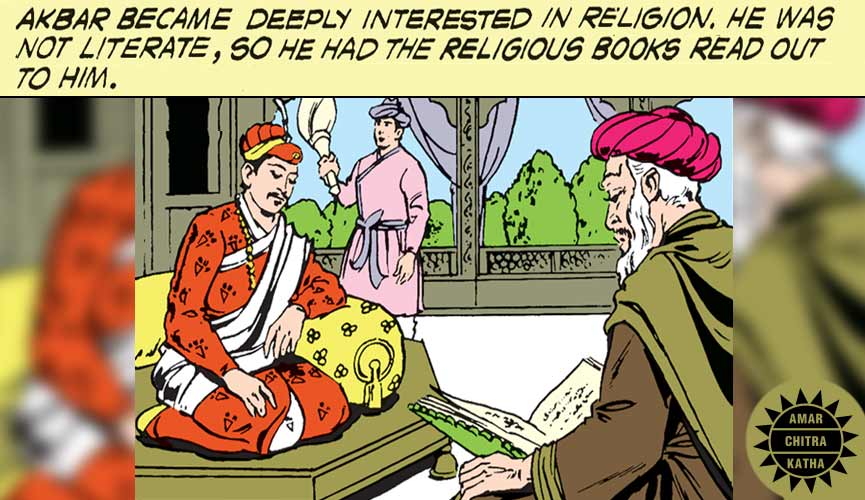
Akbarnama narrates that emperor Akbar immensely enjoyed listening to for stories across genres. He had a personal storyteller who would entertain him using various voice modulations and hand gestures. Akbar enjoyed taking note of these stories. He got numerous books translated and closely supervised and cross-checked the translations of the texts. He was so particular at it that he even berated courtier Badayuni once for changing the meaning of the initial text and interpreting the message suitable to his understanding.
Akbar cherished stories of various religions, from the tales of Amir Hamzah, uncle of the Prophet Muhammad, to the greatest epic, the Mahabharata. He had also asked the Jesuit priests, who were present at his court, to figure out the Persian translation of the life story of Jesus Christ. The book was called Mirat al-Quds, which means the Mirror of Holiness. Akbar’s library contained many Persian translations including the Mahabharatha, the Bhagavata Purana, Stories from the Panchatantra, and Harivamsha.
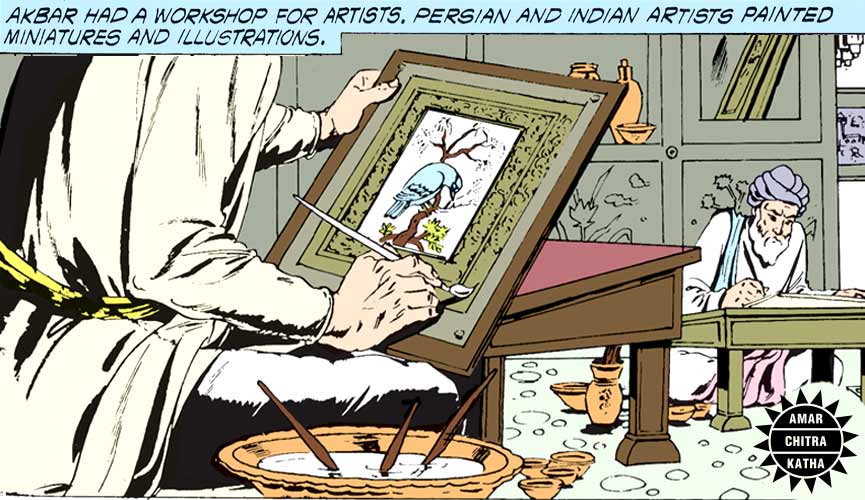
Mental sciences became crucial within the Mughal Empire. When the curriculum was standardised, these traditional studies occupied a very important place within the syllabus. The court of Akbar always had scholars who were well-versed in philosophy, astronomy, geometry, astrology, arithmetic, the preparation of talismans, incantations, and mechanics.
India, during the Mughal era, developed a stable and strong economy which resulted in a commercial expansion and greater patronage of culture. Akbar established the library of Fatehpur Sikri exclusively for women. He proclaimed that schools, educating both Muslims and Hindus, should be established throughout the realm. He promoted bookbinding, making it an artistic skill. Holy people of many faiths, artisans, writers, poets, architects, calligraphers, painters, and musicians, among others, visited his court from across the globe for interesting learning and discussion. Akbar’s courts at Delhi and Fatehpur Sikri became centres for education and training. Timurid and Perso-Islamic culture began to merge and blend with indigenous Indian elements, and a definite Indo-Persian culture emerged by the influence of Mughal style arts, painting, and architecture.
Read the complete story of the great emperor in our title Akbar available on the ACK Comics app, Kindle, Amazon, Flipkart, and other major e-tailers.
To receive more such stories in your Inbox & WhatsApp, Please share your Email and Mobile number.
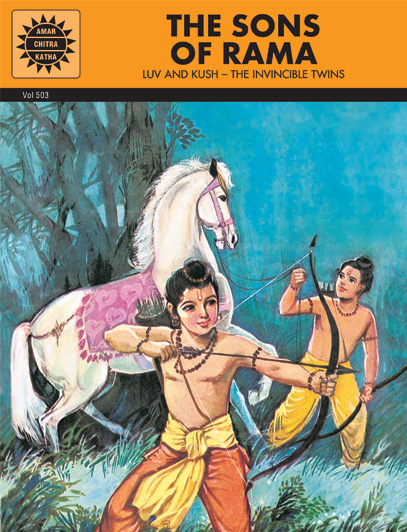
Comic of The Month
The Sons of Rama
The story of Rama and Sita was first set down by the sage Valmiki in his epic poem 'Ramayana.' Rama was the eldest son of Dasharatha, the king of Ayodhya, who had three wives - Kaushalya, Kaikeyi and Sumitra. Rama was the son of Kaushalya, Bharata of Kaikeyi and Laxmana and Shatrughna of Sumitra. The four princes grew up to be brave and valiant. Rama won the hand of Sita, the daughter of King Janaka. Dasharatha wanted to crown Rama as the king but Kaikeyi objected. Using boons granted to her by Dasharatha earlier, she had Rama banished to the forest. Sita and Laxmana decided to follow Rama. While in the forest, a Rakshasi, Shoorpanakha, accosted Laxmana but had her nose cut off by him. In revenge, her brother Ravana, king of Lanka, carried Sita away. Rama and Laxmana set out to look for her and with the help of an army of monkeys, defeated Ravana. On returning Ayodhya after fourteen years of exile, Rama banished Sita because of the suspicions of his subjects. In the ashrama of sage Valmiki, she gave birth to her twin sons, Luv and Kush.